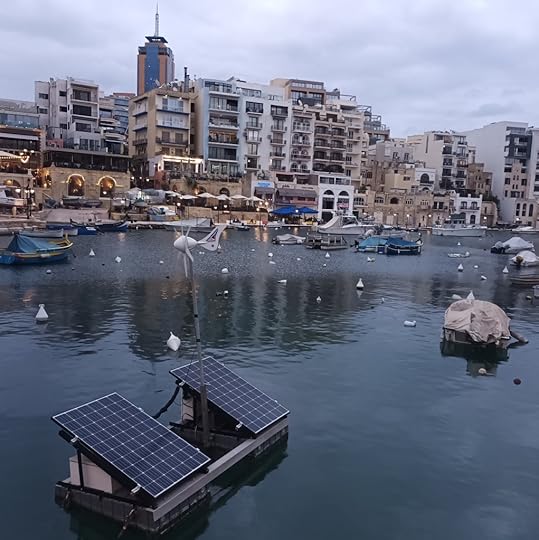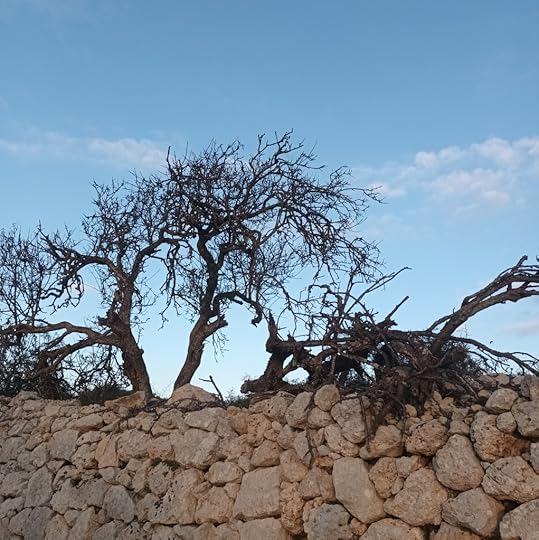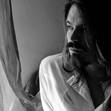What we talk about when we talk about home – Part 3
Read Part 1 here. Read Part 2 here.
The space of loneliness is of course different from that of solitude – with the latter assuming the mantle of the heightened position, the zen-like placid calm and an easy self-communion – but when you’re a kid and experimenting with the things that make you feel good and ease the pain you don’t yet have the layers of experience, of trial-and-error to really make the distinction.
I’ve spoken a lot about the in-the-moment dynamics of displacement and migration here, and loneliness – crucially, not solitude – was a big part of it for me from the beginning since there was very little to latch onto or even land on.
This is what I’ve always found funny about Malta. That the rock is totally a rock. Its undeniable state as an island predominantly defined by rock and STONE – largely the flaky-soft limestone, but still. Famous for it Neolithic temples and famous for all the subsequent temples that followed – one church for each day of the year, St John’s Co-Cathedral and Ta’ Pinu Basilica and all the rest of it. The winding country roads defined by handmade cobbled walls – precarious as they are ubiquitous, a trademark to be protected and which will determine the island’s definition for what feels like forever.
And even down underground, from the paleo-christian catacombs that snake their way across the north, the old water cisterns now fit for dark-tourism-lite tours and boutique concerts, and of course the Hypogeum: now barely reachable by the masses keen to visit all year round because the tickets prices have shot up just like everyone else…
So many perfect enclaves. So many stone spaces to snuggle up against. For shelter, for reflection… to count each crack and each pock-mark, if you like. To be guided by flaming torchlight down subterranean a subterranean passageway and then, reach a clearing and drop it down to the humid floor, and what follows will either be a period of meditation or its longest culmination – death.
But it doesn’t happen that way, does it? Instead of the earthy, enveloping powder of the pure stones by day and its chiaroscuro promises as the sun goes down, the island actually fights against itself and becomes louder and louder – taking the advice to rage against the dying light just that little bit too literally to tip it all over and ruin any remaining chance of peace.

The rocky enclosures are just the kind of spaces I would dream about when I’d head down to lunch break at Ħamrun Liceo; a place where I eventually did find friends but whose long stretches were defined with simply wanting to be elsewhere and assuming this was normal.
Shaping yourself into someone who tolerates life means negotiating the space between the physical and the non-physical, and when you’re raised by parents too scattered and frayed on their own end to offer a ballast or groundwork beyond the most rudimentary, your grasp of the non-physical is equally all over the place.
This is also the same absurd space where Bryan Adams hit anthems co-exist with the news of the Battle of Vukovar, that hum which cannot shape itself into anything coherent, let alone stone.
So, home. Malta became home. We were ‘third-country nationals’ for the longest time and then, one day in 2012, we weren’t any more. A couple of years after my mother had a stroke that would land her in a coma for a decade, we were finally mailed that much-desired olive branch: citizenship.
My father, brother and I went to the office and read out a declaration and signed a paper. The burly policewoman behind the heaving-with-documents desk pointed to another small but significant feature: a crucifix. “Catholic?” she asked us, and when we nodded no she made no fuss about it and just made us read the secular take on all this – said declaration that we would loyal to the Maltese state and respect its institutions and blablabla – and that was that.
We went back home after that, what for both my parents remained a forever home owing to their premature deaths, and what in any case for us was the longest-running home we’d known by then.
3A, Panorama Flats in Sliema. It was something of a purgatorial wreck by that point, owing my mum’s long sojourn in hospital, and then a care home from 2010 to 2020. As us kids trickled out bit by bit, my father would eventually rebrand it into a workshop space-cum-artist commune.
But in that crucial moment in 2012, it was still something of a gutted mess: we were living like roommates – as my father would take pride in saying, sloughing off any leftover parental responsibility he may have still felt beholden to – hypnotised by the puzzling absurdity of our present situation.
My mother was a beautiful, creative young woman who was holding a bunch of stuff together, and her presence in the home – this apartment, the likes of which they don’t make anymore – was a huge part of that: from its inspired decor, down to her expert hand at entertaining a varied panoply of guests, mostly culled from what would pass for something resembling a bohemian strain to Malta’s doggedly provincial social scene.
After she was gone, there was a period when the house simply took on a life of its own – where our respective rooms became cocoons and we would barely cross each other’s paths because making excuses to not confront the core realities of it all was what we’ve been taught. Our parents always gave us the impression that life was simply TOO MUCH – that there was always too much to do, that we were always too broke, that they were always too tired and too stressed for us to be adding to any of that with our own problems.
So I began to view the parties they would organise in the same way that they would – a reprieve from the inevitable, native stress that resided in all our hearts – and which subsequently exploded their own – and we could join in because, after all, we were all just roommates, right?

The permutation of Panorama into a new space for more roommates speaks to my father’s inability to move on from the ingrained idea that this apartment would be the only forever home he would allow himself, despite the residue of all the ghosts it still contained – the same ghosts he never had the gumption to confront with any real sense of finality and articulation. Speaking to one of the roommates who would subsequently populate the space – this one in particular residing for a while in what used to be my room – revealed the extent of this: “Cleaning that place to the end was impossible. There was always some rot, some mould that just wouldn’t go away.”
Apply all of the psychological cliches you can think of here: a man loses his wife and cannot muster the strength or courage to get up off his ass and leave the home they built together, and after his kids fly the coop he populates it with new kids so as to be able to exist in a version of the same patterns he was used to and thus, keep the inevitable at bay.
This is why I feel drawn to a darkened catacomb as a culmination of everything. This is the emotional legacy I’m labouring under, if we are to passively accept that we all become our parents and simply follow in their footsteps.
The fact is, however, that home is not a static object. My mother reaching out to me in the bunk bed and telling me “we’re gonna go find dad” meant that we were leaving a home to find a more permanent one – one in which the cavity of my father’s absence was no longer felt.
This emotional space is slippery and prone to unfortunate dependencies. You rely on your parents, for example, to continue carving out that space of security for you, but my own were never really able to do that, so what was left for me was my own headspace – the generous reading: ‘Mind Palace’ – where I had a degree of control and I could craft things my way, but whose particulars also inevitably pulled from existing surroundings.
The danger lies in getting tired. If you’re tired you’re more prone to lie down, and to lie down you need a solid surface that will accommodate you. So this is why you craft the idea of home as a solid space to return to and just lie down in. But without a sense of cultivation, when all that’s left is rot, home becomes a prison.
Working through this, I suppose the grandiose take is that it’s all about forward motion and sudden death. Moving from one place to a better one and then being drained my life so that you’re felled in the same spot in which you’ve tried to make a home.
When you’re felled, you’re alone. And you either die there or you achieve genuine rest.
Soon after we got our citizenship, I took advantage of my newfound privilege as a European citizen to cross a fraction of the continent on my own steam – taking a three-week trip across London, Edinburgh, Prague and Berlin.
When I came back to Malta, it was September and despite the heat, I decided to go on a solo hike up north. I failed to adequately follow a walking tour guide offered by the Malta Tourism Authority – my map-dyslexia is maddeningly legendary – and ended up prolonging my journey to a ridiculous degree.
But trekking along Dingli Cliffs while listening to Popol Vuh’s soundtrack to Werner Herzog’s ‘Nosferatu’ was transformative. The heat was of course doing my head in, quite literally in many ways, but I didn’t care.
The strumming sitar sound, the yellow stones and the occasional abandoned shrine to the Madonna. Increasingly irrational, but it was a communion with the space that I hadn’t really felt before or since.
Ends.




